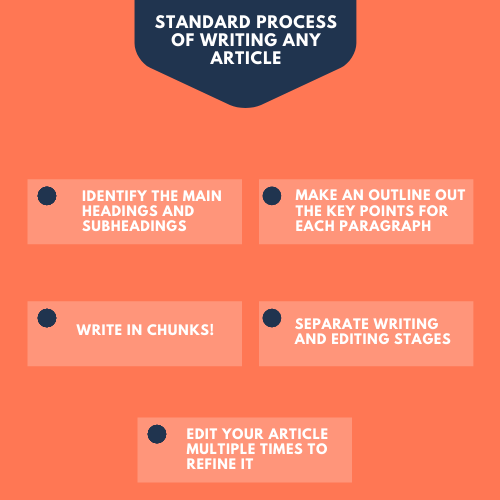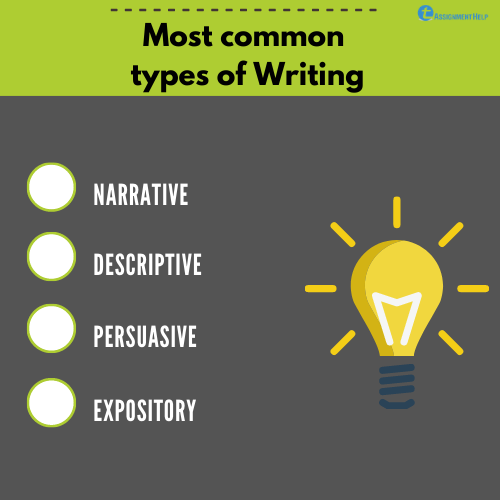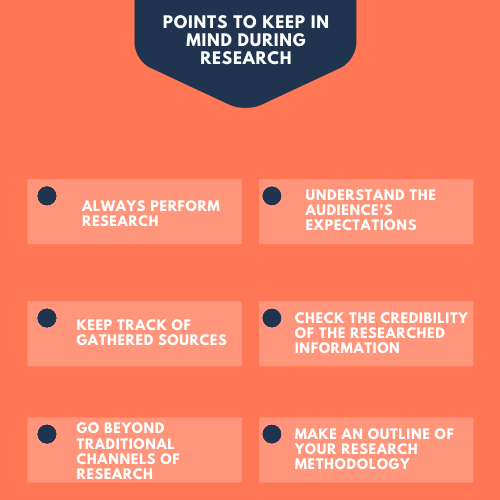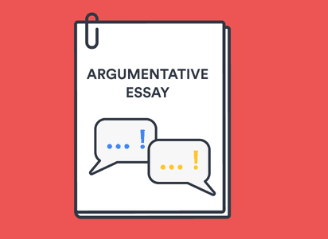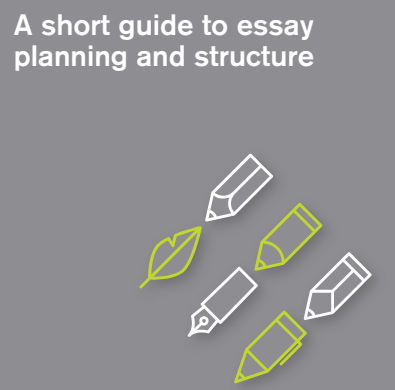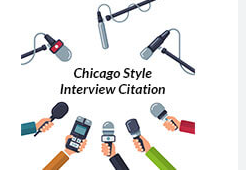How To Determine The Right Types Of Writing To Build High Quality Content

Hi students, we are again here with an informative article on different types of writing. We have chosen today an unconventional topic since, whatever insight we could give you from the academic perspective, if the student doesn’t know how to reflect his knowledge in written form, all of his efforts would end up in vain. An ordinary academic career of a student would be full of assignments like reports, literature reviews, essays, oral presentations or submissions, reflective writing, business analysis, etc. The student should have knowledge regarding what types of writing should be implemented in the context of each assignment. We have taken feedback from many students, and it has been widely observed that though most of them invest a lot of effort in the drafting process of the literature, they end up with very poor marks in their academic evaluation. There could be numerous reasons behind the deduction marks. It may quite possible that the student is relying on irrelevant sources of knowledge. In that case, they need to immediately change the methodology followed for selecting the academic sources. The second and most widely seen reason for the deduction of marks during academic evaluation is the wrong implementation and ignorance towards various types of writing.
Subscribe to our YouTube channel for more related videos
The selected type of writing has the potential to draw the attention of the evaluator and successfully conducting the ideas the writer is trying to commute to the reader. It would be upon the type of writing implemented and displayed the level of writing skills that the aggregate topic would depend on. Only writing down some random facts would not help in acquiring decent marks. Hence this article on different types of writing majorly deals with the crucial points like various kinds of writing, Various techniques to be followed in effectively writing a different type of writings, acquiring various skills. Although these factors seem to be very similar and congruent, they, in fact, possess a lot of contextual differences.Any piece of literature or essay could be drafted by implementing various types of writing. It is on the requirement and the intend of the author that different style of type of writing is implied in the task. The variant of the styles could also depend on the intended impact to be made on the author, the genre of the content to be discussed in front of the audience, etc. If taken a comprehensive approach, the types of writing could be classified into four.
- Narrative
- Descriptive
- Persuasive
- Expository
Narrative
In this type of writing, the author should have to select the approach of narrating an event or some story in front of the audience. The conversation among the characters should be displayed in the form of dialogues in the piece of literature. The whole piece of literature should have a very contextual starting, much-needed intervals and concluding section. The author could take an approach of a storyteller as is done by a narrator in a roleplay. This approach is majorly used in the tasks of a reflective report or the report analyzing the personal developmental path of an individual. By using this approach, the student could mention his progress and learning experience in a very effective way. Since drafting the report completely in a narrative mood would be quite difficult and hence the literature with the purest form of narration could be rarely seen in the academic stream. The core theme which is always used in the narrative ow writing in the academic stream is major regarding how a certain conflict was overcome or encountered. The whole experience of overcoming a hurdle or challenge would turn out to be a very good piece of knowledge for the audience having some background. It should be noted that plainly just describing the whereabouts of the conditions and contemporary surroundings would not be taken into account as a narrative type of writing. A certain format should be followed in the narrative type of writing which should focus on the challenges faced by the person in a specific instance. In the academic stream, the format is also termed as the plot.
If taking the instance of art literature, the works coming under the genre of poetry, novels, biographies and short stories. The contentious situation of conflicts, disputes, inaccurate actions, problems, etc. are discussed in the narrative type of writing.
Persuasive
It is the arguments and the supporting reasons which entail the maximum significance of the persuasive type of writing. In this type of writing the author is required to adopt an opinion and thus justify it by relying on authentic pieces of evidence. The author is required to persuade the audience to accept the arguments he is making regarding a certain topic. In the academic career, an average student mostly deals with the task to draft a persuasive type of writing. The major task of the author to convince the audience that al the arguments made in the piece of literature are valid. The major challenge behind drafting this piece of literature is to search for valid pieces of evidence regarding an argument. The author should also take in mind that the selected topic has a wide scope and is the point of debate and content among the audience. The author is required to know both the for and against features and arguments of the topic, which would help in countering the questions from the audience. The most effective method which could be used in this type of writing is to support the contrary arguments and gradually refuting it by providing relevant and authentic pieces of evidence. Though this should be done very cautiously, and if deemed to be a very tough or inappropriate approach to take, you should just plainly start with the intended argument. The description in the persuasive types of writing should be done from the perspective of the third person. In the persuasive type of writing, the author tries to canvass and convince the audience by relying on the emotional attributes rather than another type of writings which generally on the approach of empirical and rational methodology. It has been commented by the scholars that every piece of the article should be toa level persuasive to the audience, rather being just a cold and dispassionate set of arguments, which fails in the ultimate motive of the task. As the term persuasive signifies, the persuasive type of writing involves the inclusion of the biased opinions, justifications, and arguments of the author. As mentioned above, the core motive behind implying a persuasive type of writing is to coerce ethically the audience to believe the opinion of the author. The instances in which the persuasive type of writing should be implied are complaint letter, advertisement articles, Critical reviews, Cover letters, Editorial sections in the newspaper, recommendation letters, etc.
Descriptive
The descriptive type of writing is used by the author to provide a delineation of the intended context or event. There is not many technicalities or any hard and fast rule to be followed in the implementation of descriptive type of writing. The possible feelings of a human towards an event or experience could be mentioned by using this methodology. The feelings may include sound, smell, love, taste, agony, happiness, etc. To describe the subjective perception of the author, the descriptive type of writing is the aptest format to be used. If roughly mentioned the descriptive type of writing helps the audience to connect his feelings to the imaginary world. If the student is asked to provide his opinion on any literary work or is asked to elucidate any of his experiences, this approach would help him to provide a verbal picture of his ideas and experience in front of his audience. The author is required to have very high imagination and proficiency in the English language to complete a task in descriptive types of writing. If the student lacks vocabulary and skill of effective writing, he would not be able to provide quality work in this type of task. It should be taken into account by the student that while drafting literature in these types of writing you should evidently describe all the context in the first person. The whole body of the work should be rich with adverbs and adjectives. The use of phrases and idioms could be done for making the whole elucidation a much more attractive one. In this context, academic language and generic data should be excluded and much more emotional aspect of the author should be revealed in front of the audience. A descriptive task is rarely being assigned to the student in his academic career. Though these types of writing should be mastered by the student since it would turn out to be very handy to him in the corporate environment where he would work. Actually, the descriptive type of writing is used to a certain level in all sorts of literature. The absence of the descriptive types of writing in literature would make it very morbid and indicate the lack of ambition from the behalf of the author. It could be also be claimed that the descriptive type of writing holds poetic characteristics. The description could not be account for as the plain elucidation of the respective event. It needs an ample amount of imagination and an innovative approach to complete the task successfully. The descriptive types of writing could be implemented in instances of Anecdotes, Novels, Histories, Poetry, Biographies, etc.
Expository
The various ideologies or concepts regarding a subject are being discussed under the expository types of writing. In other words, the expository type of writing could also be termed as informative writing. The expository type of writing is majorly used to provide the audience with crucial information regarding someplace, event, issue, books, articles, person, ideology, etc. Unlike other types of writing, the expository type of writing uses the display of relevant and authentic pieces of evidence. This to provide an authentic background to the information shared by the author. Heavy use of numerical data, statistical figures, authentic data, official elucidations, the impact of various strategical policies, etc. could be seen evidently in the expository types of writing. There is no place of any person biased or the feelings of the author towards any issue in these types of writing. Hence the use of the first person and the reflective discussion of the context could rarely be seen in these types of writing. The students often tend to show confusion in between the writing styles of description and expository. This is quite justifiable since both of them involve most of its approach in elucidating the provided context. The major difference between these two types of writing is that the expository methodology only focuses on the events and perceptions of the external surroundings. The impartial and authentic description of any matter could be effectively explained by the expository types of writing. Unlike it, the descriptive types of writing majorly throw their focus on providing the elucidation relying on the emotional aspects.
A very systematic approach is used in the elucidation of the context which is heavily entailed with the use of authentic facts and the graphical representation of the same. Since a strict format is used in this methodology, the whole literature would provide the sequence justifying the logic of the context. The student should take into account that he is not allowed to provide his personal opinion regarding the raised issue in the ask provided. The instance when the author could make the most of expository types of writing is in the recipes, academic books, official articles or journals, scientific research journals, Newspaper articles apart from the editorial, etc.
Point to be noted
Although you know these four types of writing, you should possess the logic to use the apt types of writing in your assigned task. The student who belongs to the literature stream should imply the descriptive form of writing in his task of the research paper. Though the person who is intending to draft an article that reviews or criticizes a particular event or piece of literature then it is by the persuasive types of writing that he could make most of the outcome or result. Though if the student pertains to the science stream and is asked to prepare a research paper, then the expository types of writing would be the most suitable for him. If you are still confused about what types of writing should be implied or how to actually imply different types of writing, then you could confidently rely on our assignment help services provided at totalassignmenthelp.com
Methodology a storyteller should adopt in his piece of literature
The person who has intended to draft storytelling literature should possess the quality of generating various emotions and senses in the minds of the audience. The description should consist of some characters that may intrigue the characters involved in it. If the writer fails to attract the interest of the intended audience then the whole effort would go in vain. The first step to be followed by the author is to clear all his mind from unwanted and disturbing thoughts. Recall an incident or a story that has enthralled you. The author should connect himself with the characters of the story since if he is not totally interested or totally dedicated towards it, the process of narration could not be done properly. You have to travel through different aspects of the characters and adopt an analytical approach rather than a normal listener. Analyze the factors that have made you connected or attracted to that particular story or event. What impact has the types of writing used by the author made on you? Is it the sadistic nature of the blissful theme of the story which fascinated you? A very in-depth analysis of the story should be done by the narrator before entering the task of narration. The art of narrating the story is not any less hard or inferior than drafting the story itself. It is the narrator who by his extraordinary expressive skills and vocabulary power that he makes the audience stick to the description. The use of heavy alliterations and idioms along with the colloquial language would actually attract the audience irrespective of their occupational or societal background. The author should stick to his own narrative style rather than copying other people. The best way to take the grasp of narrative skills and knowledge of different types of writing is to read a lot. Only by being open to and receptive towards all form of literature that the strong hold on different types of writing could be acquired. This would eventually add up to the quality of narrative literature you have intended to draft. In the below section of this article on different types of writing, we have discussed some guidelines to augment the write up skill. We hope that you would find these tips helpful for your assignments.
How to generate compound and varied feelings and mindsets among the audience?
As we all know it is proven that the human beings have six senses. It is by these senses that a particular situation is perceived and judged by a person. Do not leave all the imagination to the reader. Please invest some effort to make the whole literature a bit more impressive. You should device out your style of writing which would help in expressing all the ideas and facts you have intended to mention in the literature. Only if these steps are being followed by the author in his work, the piece of literature would display some quality.
The author is required to display the human feelings and perceptions like taste, sound, scents and other form of sensations. If you juxtapose the piece of literatures drafted by a seasoned writer and an amateur one, you could that the major difference is in the innovative and attractive explanation of human feelings. Writing a context by efficiently relating it to the human perception is a very demanding task, and if the writer has been successful in doing that, then he would obviously be considered as a good writer. Only the novels and stories which are well proficient in the above said dynamics could be classified as a good piece of literature. It is the heavy use of alliteration and vocabulary that is still keeping some of the literatures as the evergreen ones.
Generating some interesting and multifaceted characters
After the above-mentioned factor, the secondary preference should be given to the selection of characters. The characters in the literatures should have depth and should fascinate the audience in a way that they could relate most of their characters with daily life. If the literature holds the characters with less depth and insignificant background, the probability is high that it would be rejected by the whole audience. The strong background doesn’t mean that the character should be masculine or have high presence in the whole role play. The characters should have high relevance to the context of the outline and have pertinent role. The various characters with intriguing and diverse personalities would obviously contribute to the quality of literature. This aspect is more of a qualitative nature which could not be measure roughly by any quantitative measure or unit. If taken the instance of movie Dark Night Rising, the absence of the Joker character done by Heath Ledger would have drastically reduced the quality of the whole script. The character of Joker is still remembered and admired by the public. If taken the instance of old literatures, the Shakespeare novel of Julius Caesar would have been dull if the character of Brutus was not such a brutal and inhuman being. The character of Brutus is not a mediocre and is still revered by the public. The various roles, whether it is positive or negative should have major contribution and relevance with respect to the theme.
Attracting the reader towards the content
Only if the literature is written in utmost innovative with virtuous vocabulary, the audience could stick till the end of it. The content should be very engaging and should generate a feeling of empathy towards the character in the storyline. It is mostly the tragedy or an action scene which engages the audience to a certain literature. The story could be a little complex and should be a lucid one like other form of literatures. The factor of suspense is another matter which help the author and script to attract the audience and thus carry them till the end of the storyline. If you could master in these writing skills, for sure would end up to be a better writer.
Major techniques associated to individual types of writing
In the below section of this article on different types on writing, it is being discussed on what aspect should be concentrated while drafting an essay, website, speech, etc. Let us have a detailed look into it.
The approach majorly consists of five stage
First stage: In this initial stage of the writing process, the related data and the information is being searched by the writer. Without it, the writer could not develop his topic and thus a comprehensive research is needed for it. Various traces of the required data could be obtained from the literatures like various books, related research papers, observations and researches made by different scholars, websites, by conversing with knowledgeable and the seasoned people in the connected field, etc.
When a writer enters into the mood of writing or decides to draft literature regarding a topic, he would tend to drift into an incubation period. This idle time should be utilized to speak with some intellectuals and related people so that much more information could be obtained regarding the t
opic. This would add up to the quality of the literature and conclusively would help in removing the writer’s block. If you get the nutshell of what should be included in the literature, the whole process would get concluded in a very systematic way. In other words, the mental catharsis of the author would be at a very higher level.
Use of online websites: The change that had brought the lives of humans by the internet is not less significant. We should be much thankful for the scientific advancements and digital revolution that our current life is much easier than our predecessors. Now the world and the information available all over the world seems to be very accessible since the medium of the internet is available to every common person. The online platforms like Quora, Wikipedia, Facebook, YouTube, Ted Talks, would provide you with an immense amount of relevant information. You should make the maximum use of these online platforms.
Relevant Books: You should visit some library and search for the books which may deem to be relevant for your literature topic. Conduct exclusive research through these books and deduce out the content which would be most suitable for you. Try not to copy the content as it is and just try to borrow the ideology or the concept. Noting down the required set of information would be the aptest approach in this task.
Observation: For a person, finding out a relevant source and observing through it for the required content is not much of a challenge in the modern period. This because there would be a plethora of reference material if you search for a keyword online. The person who has adopted writing as his occupation is required to observe most of the data in the interested field. Being able to determine the right types of writing to use while preparing a content is also critical to enhanse the message being shared. If the selected topic is very unique and the content is not easily available, then the writer is coerced to move out of his comfort zone and has to create content from his own experience, perception, and imagination. Let us take an instance that you are provided with the task to make an article regarding birds, but you live in an urban area surrounded by flats where birds are scarce to be seen. In that case, you would be forced to go out in gardens, bird sanctuaries or even in the wilderness to observe the birds.
Second Stage
By this stage, the writer could have collected the data and other information which would be quite enough to build up his literature. The assembled information should be arranged in proper order so that it could justify the contextual logic. It is at this stage that the author should take into account the interest and expectation of the audience to determine the most effective types of writing to use on their content. In this stage, the process of constituting a Frameline for the literature is done. The crucial tasks of creating the mind map and drafting the content according to it are also done in this step.
Preparing a framework: After successfully committing stage 1, the task of framing a better outline would get simplified. The writer could plan where the collected data would cause maximum impact. The sections like the Introduction, Main Body, and the Conclusion constitutes to be the major segment of an essay. Similarly in the literature of a story writing, there comprises segments like characters, genre, theme, plot, etc.
Mind Map: In this stage, the author is required to prepare a rough mind map in his notebook. The major motive of preparing the mind map is to prepare a strong opinion based on the collected data. The all through the process of preparing the piece of literature could be visualized beforehand by the author. The effective push for the writer at the initial stage would be very helpful for the whole process.
Process of drafting: This is the crucial stage in which the author starts the writing process. This is the stage in which all the effort of the writer comes into light. Since the mind map and all the data is available to the author ready hand, the whole process would be committed without any interval. After this stage is complete a feeling of completeness and sauternes could be perceived by the author.
Third Stage:
After writing the first copy of the literature, revise it through it for several days. After some time, you would get the feeling of revising the whole literature. A special effort should be taken by the writer to revise again the drafted literature. You should conduct the process of reassembling the whole content, conducting rework after strict proofreading, as per the detected mistakes the literature should be reframed, etc. As per the observation from these activities the second draft should be prepared for the previous literature. The whole process should be repeated until you get an impeccable solution.
Rework: This is a very casual process since you have to just look for any grammatical or contextual errors. The loopholes should be covered and hence the whole work should be made impeccable. It is only by improving the literature that the solution could be made better.
Reframe: After there is some rework done in the first copy, it would be quite obvious that the literature would need some serious reframing. Some sections would require restructuring and omission. In this process sometimes the writer has to remove the sections which are contextually ironic though how much dear it is to him.
Reassemble: Even if taken the instance of a diamond, it is created only after the repeated process of polishing. Similar is in the case of impeccable literature. Before coming to the stage of reassembling, the whole process could just be classified as a brain exercise. After coming entering the stage of reassembling, the process would get much closer to the heart and the mental process. After the writer invests so much time and effort into literature, a possible urge would emerge the literature public and accessible to the audience.
Review and repeat: Just make the habit of reviewing your work and repeat the above process until you get total saturation in the quality of the literature. This is process is to ensure that the literature is devoid of any errors. In the process, you should strictly conduct the proofreading session and restructure the sentence if needed with some relevant phrases. You should avoid the sentence which is complex and should restructure into a simple sentence. The literature should be devoid of any grammatical errors. At this point, there should be no further corrections possible in the content. If there are any possible corrections do it in this stage. This stage is much more reflective and thus the literature should be rated by the author himself.
Fourth Stage
Make sure that the piece of literature is being checked and verified by the intellectual people you have access to. Get a very honest reply from them whether it is positive or negative, and try whether it could be assimilated into your work as well as whether you have selecting the types of writing.

